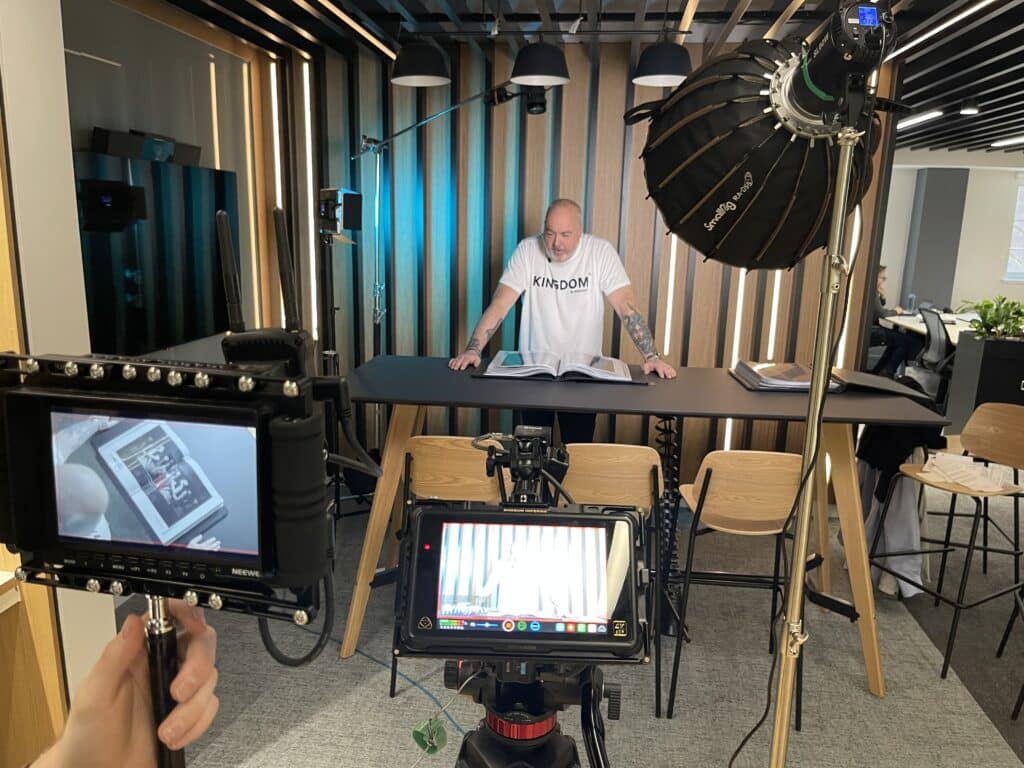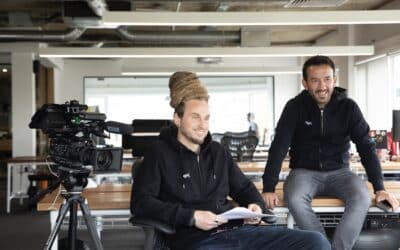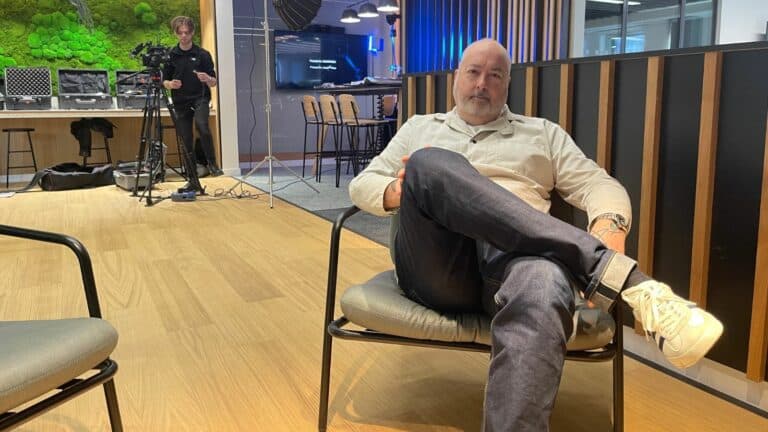We’ve all seen those cringe-inducing LinkedIn posts from fad morning routines to a parade of pointless anecdotes to spark engagement, thanks to ever-changing social media algorithms.
It’s exactly what Julian Kynaston, chairman and founder of Leeds-based brand consultancy Propaganda and founder of cruelty-free make-up brand Illamasqua, wanted to avoid when he set out to work on his own personal branding.
“Years ago, there were a number of people in our industry who were beginning to lead on this. Steven Bartlett would be the one everybody would cite but there were others and I just cringed. It made me want to punch the screen,” Kynaston tells Prolific North.
“I just thought it was the most utterly patronising, contrived pile of sh*t I’ve ever seen – I can’t do that.”
Personal branding isn’t a new concept, it’s always been prevalent in the business world in the form of an interview, offering an opinion for a feature or a press release.
But with the evolution of social media, it’s now transitioned into an “incredibly transparent” real-time arena online. So what was behind Kynaston’s decision to focus on his personal branding and how did he go about it?
“If you go into that game, you’re in it and you can’t just pop in every two weeks or three months. It does become part of the job.”
It was at this point he decided to enlist the support of Leeds-based B-corp personal branding agency Jago.
Jago is on a mission to shape authentic leaders through a number of services, from one-off workshops to more extensive coaching programmes.
“Had I not had Jago in my world, I would have been too stop-start with it. For me, what’s important is that they will force me to be consistent. Whether they have to hound me some weeks, cajole on others, they are very, very good at ensuring that I am consistent. That takes some business to do that cos i’m a bugger.”
But what does personal branding mean to Kynaston and what was he seeking to achieve?
“I’m a brand man. I try to build brands that are loved, which often means to get that you’ve got to accept that some people are going to hate them as well,” he explains.
“If anybody asks me what branding is, it’s about being loved and the price of being loved is being hated. The thing you have to leave behind is being liked because it’s benign.
“That’s where I enter personal branding because I think it is a very unforgiving and transparent arena. If you go in there to be liked, you’re going to be part of the noise and you’re going to be part of the background. It’s not going to be interesting and people want an opinion.”
Not shying away from being opinionated, and a self-professed “character” of his own making, he was keen to make sure he was voicing his thoughts in the right way – and for the right reasons.
“I’m increasingly left wing in my thinking. The older and wiser I become, I pull no punches about that online or on the fact that I think, as a brand man, I’m in a position of power to do good now and it’s not all commercial.”
Although his main priority ultimately is to Propaganda as its founder and chair, Kynaston wears a number of hats. He’s a non-executive director for a number of businesses and chair of menopause network GenM too.
Jago has helped him to build a personal brand that is not just “respectful” to all of his roles, but also at a deeper, more personal level, where he can share the things he really cares about.
With his GenM hat on, a recent post went “mental” when he delivered a poem he’d written to camera about the symptoms impacting women with menopause, to break the taboo.
The idea behind the video stemmed from a detailed conversation with Jago’s co-founder Steve Richards. During Jago’s research in its first Personal Brand Benchmark Report, which you can download here, regularly using multimedia in personal branding tends to lead to better results in generating leads and creating meaningful connections.
“They get me to dare myself,” he explains. “They’ve figured me out, broadly speaking and I think they know what flicks my switch”.
“Me and Steve will sit in a room by ourselves. After some steering, I said I’ll write a poem about all 48 symptoms of the menopause and I’ll deliver it to the camera. Somehow, he makes me do that, so there’s the creative end and pushing me outside of my safety zones constantly.
“That good tends to come out in my menopause evangelism at an agency that I really, really enjoy. That’s a side of life that no one would have ever seen of me had it not been for this, because there wasn’t a channel or the opportunity to talk at that level of nuance before. So It is incredibly personal.”
“Guess what? I don’t want to f*cking work for those people”
With Jago’s mission of building up ‘authentic’ leaders, what does authenticity mean to Kynaston?
“Authenticity is the ability to say you don’t always get things right, you’re a human being and you’ve got weaknesses, the ability to say I don’t get up at f*cking four o’clock every morning.
“I spend half the time talking about men’s obligations and the menopause, and I do speak a lot of time about the fact that I am anti fox-hunting. On a personal level, I’ve put a lot of money into that.
“That’s something that most people don’t dare put out in the business climate because so many clients out there go shooting on the weekends. Well, guess what? I don’t f*cking want to work for those people. So it kind of acts as a sh*t filter.”
Working with Jago has helped him to be more open on a number of issues he wants to tackle, especially why he will never pitch to brands, and why the wider agency world should ditch the pitch altogether.

“You can write that, you can put that in a press release, but you’ve got to be prepared to explain it in absolute detail as to why we believe it’s fraudulent nonsense and why we believe it holds our industry back from the top table, which it does.
“More than any other platform, that’s the bit I’ve really managed to get out in a way I’ve failed to get out for the last 50 years.”
Although he’s happy to risk the price of being hated to avoid being benign, he did initially have some reservations.
“Working with Jago has led to more exposure. I thought it was going to be a real polarisation for me but the amount of people from my past, people who I thought I’d probably rubbed up the wrong way or ex-employees I jarred with, have re-entered my world in a really positive way and got behind it, even competitors from other agency bosses or staffers. That was the biggest surprise for me.”
It’s had a big impact on attracting talent into his businesses too. At Propaganda, the number of people wanting to work at the agency has “tangibly lifted.”
“Out of everything we have ever done, if there was one thing that’s attracted people in wanting to come and be on our books, this has been the biggest thing ever. We are flooded with people that want to come in and be part of that culture that I talk about and represent. Existing staff, and I hope they don’t mind me saying this, are really proud of working for somewhere that has an opinion – even if it’s not for everyone.”
He was most nervous about what clients would think but it’s proved to be a great “sh*t filter”.
“Clients really, really like it. As a source of new business, and I genuinely never went into it for this, there’s been nothing more powerful in our wake over 30 years than what we’ve seen coming in from the work I’ve been doing on that personal branding front.”
“It’s another level we don’t need to worry about anymore, because clients already know what we stand for. It stops an awkward conversation without having it proactively.
“It helps us believe we don’t have to play that game, and aim for better.”
Download Jago’s personal branding report here to find out more about how you can develop a strategic approach to your own personal branding.











